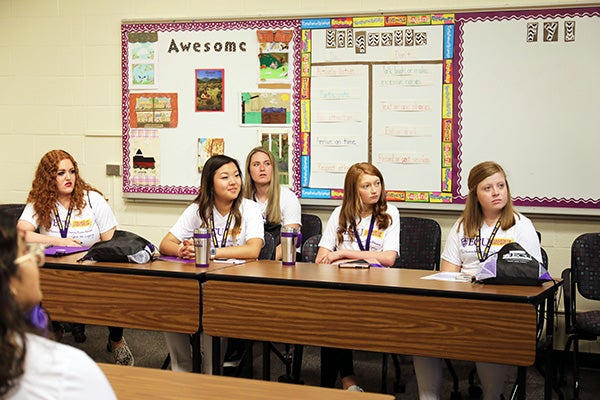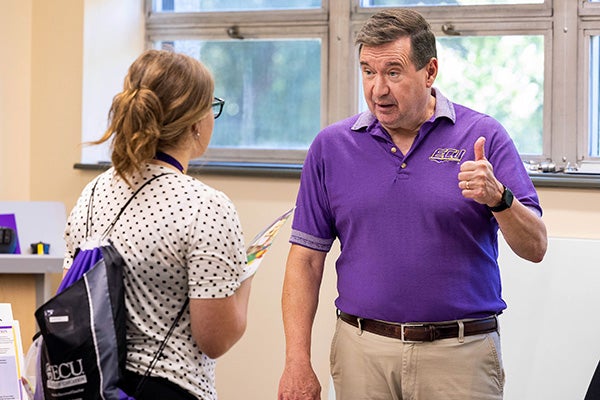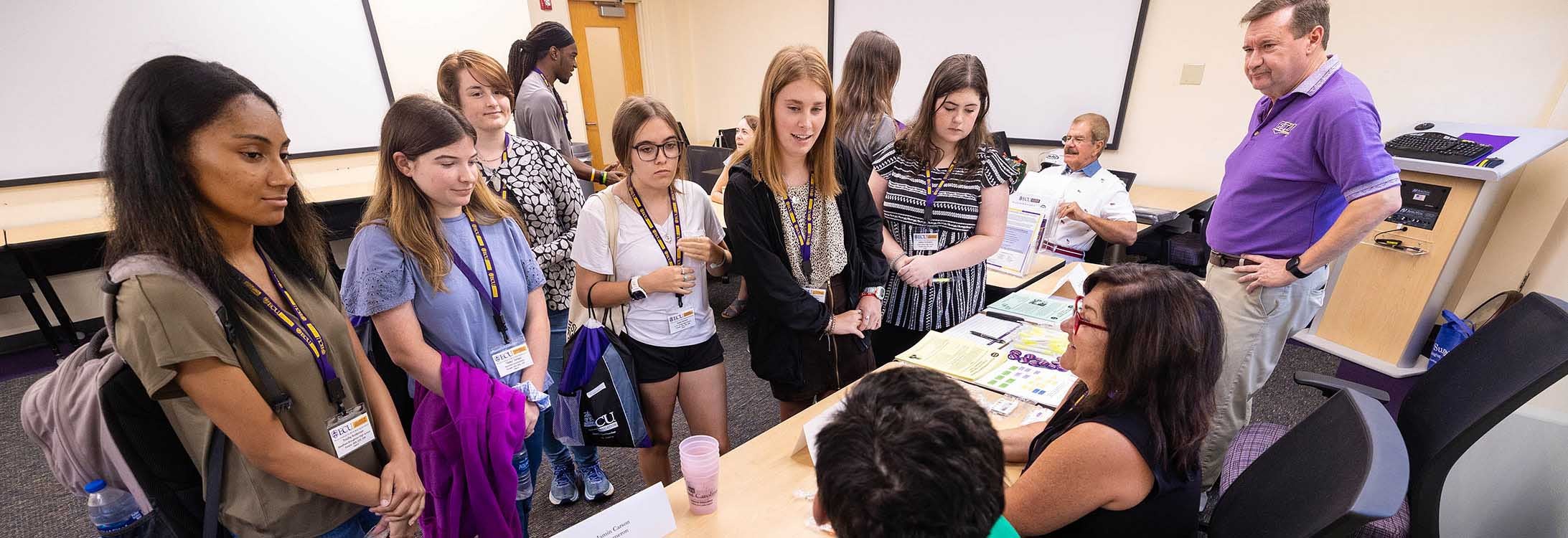REACHING FUTURE EDUCATORS
Institute gives high school students introduction to teaching
High school students interested in pursuing careers in education had the opportunity to attend a free, two-day event at East Carolina University.
The Pirate Institute for Rural Aspiring Teacher Educators (PIRATE), hosted by the College of Education, allowed rising high school sophomores, juniors and seniors to interact with current ECU education majors, faculty and staff to see if a teaching career would suit them.
“It was a great experience to meet other students who have the same interest in college as myself, especially meeting those few that I clicked with since they were even closer to my field of study,” said Brandon Dobra, a rising senior at J.H. Rose High School.

PIRATE Institute participants had the chance to interact with Mursion, an immersive learning experience where students can get feedback on their teaching in a virtual setting. (Photo by Kristen Martin)
While participants were able to participate in typical college visit activities, such as touring campus and learning about the admissions process and college life, they also had the unique experience to plan a mini lesson to teach their peers.
“My favorite part of the two-day experience was having the chance to teach a mini lesson,” said Jazmin Garcia, a rising senior at Johnston County Early College Academy. “It helped me practice and learn new tactics and skills needed to become a teacher.”
Giving high school students the opportunity to go beyond a regular college visit is extremely beneficial for their college decision-making process, said Dr. Justine Okerson, senior associate director of ECU’s Office of Undergraduate Admissions.
“The undergraduate admission office was thrilled to play a role in the PIRATE Institute as we know the most important component of searching for a college is the experience of visiting the college in person, interacting with faculty, exploring our facilities, and imagining their own educational journey while at ECU,” Okerson said. “The icing on the cake for this program is having a firsthand experience with their department of interest — the College of Education. These programs are essential in the college choice process, and why we offer academic day programs for prospective students throughout the year.”
The event was packed with activities relating to education, from a discussion on teaching careers and fundamentals to demonstrations of Mursion, a simulated program that helped provide a student teaching experience.
“Helping students to better themselves is a big part of teaching,” said Harley Jo Bruce, a rising senior at Lee County High School in Sanford. “I learned that at ECU. This made me realize how much I enjoy (helping) other people (become) the best person they can be. It helped me realize that teaching isn’t just about one person, but a group of people who want to make the world a better place for students and education.”
For several years, COE leaders discussed the idea of holding programming for high school students to introduce them to education and ECU, and made outreach one of the major priorities for the college. An email from the UNC System office offering potential grant money for educator preparation programs’ outreach efforts helped bring the idea to fruition.
“If we can get them to campus, we have them hooked,” said Dr. Dionna Manning, director of the education community of scholars and education living-learning community. “If we could get them here to connect with our current students and see the school spirit and passion and that our students and the faculty and staff want them here.”

Dr. Ron Preston, an ECU mathematics education faculty member, advises one of the high school students attending the PIRATE Institute. (Photo by Rhett Butler)
Manning and Dr. Catrina Davis, the COE’s lead coordinator for professional development and student outreach, modeled the institute after the college’s academic days for prospective students. While they hoped for a successful first year, the turnout was beyond their expectations.
“We felt we could maybe get 20 to 25,” Manning said. “We had no idea that we’d have over 60 registered, but we did have a good network that we felt comfortable with outreach to push this opportunity out to.”
Originally, Manning and Davis planned for only one PIRATE Institute, but quickly changed plans to offer two institutes — one in May and one in June — to meet the high demand. ECU students successfully created a sense of community with program participants.
“The student leaders did a phenomenal job of facilitating that sense of community and helping the students all get to know each other and feel comfortable,” Davis said.
The institute’s main goal was to bring students genuinely interested in becoming a teacher to ECU’s campus to learn more about the program, but it also served as a pipeline to connect those students with the university.
“Hopefully participating in the program helps them clarify that goal for themselves a little bit more,” Davis said. “We were really intentional about trying to expose them to information where they could learn about different degree programs and the differences between teaching K-5 versus middle school through high school.”
Current education students served as mentors and program leaders, building connections with the participants.
“We wanted to create that pipeline and then develop those relationships so that they have that continued support,” Manning said. “Definitely it’s not a one-and-done event. We wanted to introduce them, establish those relationships and give them support until they get here, get enrolled and can apply for the living-learning community or for scholarships.”
While the short-term goal for the program is mentoring this summer’s participants and readying themselves for next summer’s institutes, Manning and Davis would love to expand the program.
“A big goal would be able to do this on a tiered approach and do the mentoring to take them to the next step, depending on funding and support,” Manning said.
